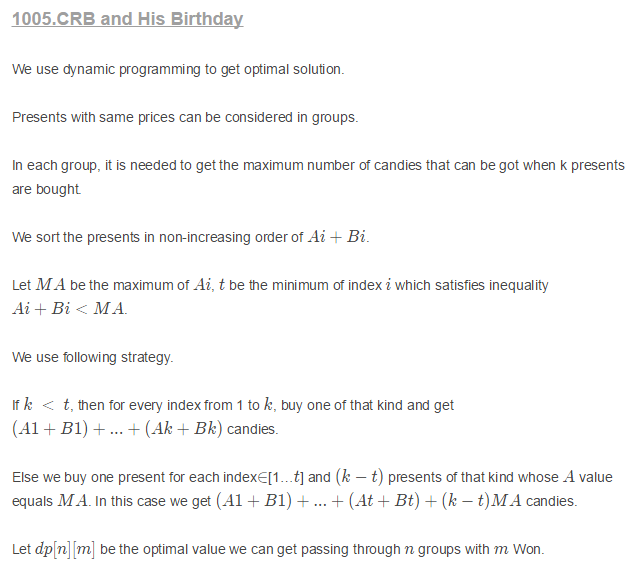HDU 5410 CRB and His Birthday(完全背包)——多校练习10
CRB and His Birthday
Time Limit: 2000/1000 MS (Java/Others) Memory Limit: 65536/65536 K (Java/Others)
Problem Description
Today is CRB's birthday. His mom decided to buy many presents for her lovely son.
She went to the nearest shop with M Won(currency unit).
At the shop, there are N kinds of presents.
It costs Wi Won to buy one present of i -th kind. (So it costs k × Wi Won to buy k of them.)
But as the counter of the shop is her friend, the counter will give Ai × x + Bi candies if she buys x ( x >0) presents of i -th kind.
She wants to receive maximum candies. Your task is to help her.
1 ≤ T ≤ 20
1 ≤ M ≤ 2000
1 ≤ N ≤ 1000
0 ≤ Ai, Bi ≤ 2000
1 ≤ Wi ≤ 2000
She went to the nearest shop with M Won(currency unit).
At the shop, there are N kinds of presents.
It costs Wi Won to buy one present of i -th kind. (So it costs k × Wi Won to buy k of them.)
But as the counter of the shop is her friend, the counter will give Ai × x + Bi candies if she buys x ( x >0) presents of i -th kind.
She wants to receive maximum candies. Your task is to help her.
1 ≤ T ≤ 20
1 ≤ M ≤ 2000
1 ≤ N ≤ 1000
0 ≤ Ai, Bi ≤ 2000
1 ≤ Wi ≤ 2000
Input
There are multiple test cases. The first line of input contains an integer
T , indicating the number of test cases. For each test case:
The first line contains two integers M and N .
Then N lines follow, i -th line contains three space separated integers Wi , Ai and Bi .
The first line contains two integers M and N .
Then N lines follow, i -th line contains three space separated integers Wi , Ai and Bi .
Output
For each test case, output the maximum candies she can gain.
Sample Input
1 100 2 10 2 1 20 1 1
Sample Output
21HintCRB's mom buys 10 presents of first kind, and receives 2 × 10 + 1 = 21 candies.
Author
KUT(DPRK)
Source
2015 Multi-University Training Contest 10
题意:CRB生日,妈妈要给他买礼物,妈妈有M元钱,这家店有N种礼物,因为店长和妈妈是熟人,所以若第i种礼物买x件的话,店长会给妈妈Ai*x+Bi颗糖果,现给出每种礼物的单价、Ai值与Bi值,问妈妈最多能拿到多少颗糖果。
放上出题人的解题报告解题思路:刚拿到这题的时候就知道是完全背包的问题,因为每件礼物的数量无限多,我可以不取、取一件或取多件;而01背包的话是每种商品只有取或不取,没有多件之说;至于多重背包,则是每件商品的件数是有限的,告诉你的。关于完全背包,不懂的可以点链接,表示这个人讲解得挺好的。
该题知道是完全背包之后,问题还并没有解决,因为单种礼物能获得的糖果数与购买的礼物件数成线性关系,所以一件与多件的差距在于a[i]的倍数,而买或不买的差距则在于a[i]+b[i]。因此,b[i]的贡献仅在于买该种礼物的第一件
提供几组样例参考
Input
100
100 2
10 2 1
10 1 2
Output
22
Input
100
50 3
10 0 1
15 0 2
11 0 2
Output
5
#pragma comment(linker, "/STACK:1024000000,1024000000")
#include<stdio.h>
#include<string.h>
#include<stdlib.h>
#include<queue>
#include<math.h>
#include<vector>
#include<map>
#include<set>
#include<stdlib.h>
#include<cmath>
#include<string>
#include<algorithm>
#include<iostream>
#define exp 1e-10
using namespace std;
const int N = 1005;
const int inf = 1000000000;
const int mod = 1000000007;
int s[N*2][2],w[N],a[N],b[N];
int main()
{
int t,m,n,i,j;
scanf("%d",&t);
while(t--)
{
scanf("%d%d",&m,&n);
memset(s,0,sizeof(s));
for(i=1; i<=n; i++)
scanf("%d%d%d",&w[i],&a[i],&b[i]);
for(i=1; i<=n; i++)
for(j=0; j<=m; j++)
{
s[j][0]=max(s[j][0],s[j][1]);
if(j>=w[i])
s[j][1]=max(s[j-w[i]][0]+a[i]+b[i],s[j-w[i]][1]+a[i]);
else
s[j][1]=0;
}
printf("%d\n",max(s[m][0],s[m][1]));
}
return 0;
}
菜鸟成长记

